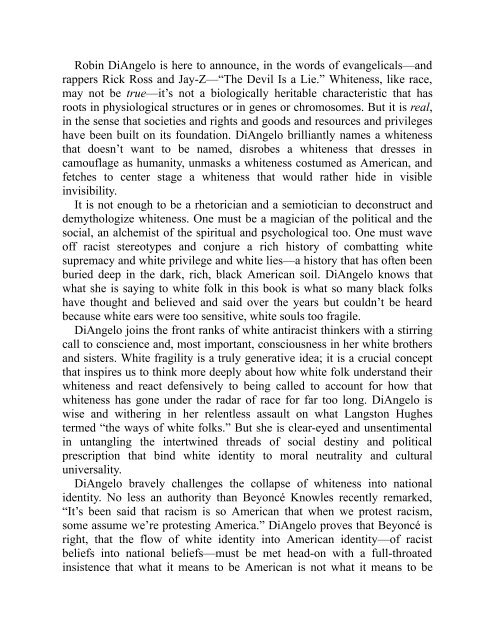You also want an ePaper? Increase the reach of your titles
YUMPU automatically turns print PDFs into web optimized ePapers that Google loves.
Robin DiAngelo is here <strong>to</strong> announce, in the words of evangelicals—and<br />
rappers Rick Ross and Jay-Z—“The Devil Is a Lie.” <strong>White</strong>ness, like race,<br />
may not be true—it’s not a biologically heritable characteristic that has<br />
roots in physiological structures or in genes or chromosomes. But it is real,<br />
in the sense that societies and rights and goods and resources and privileges<br />
have been built on its foundation. DiAngelo brilliantly names a whiteness<br />
that doesn’t want <strong>to</strong> be named, disrobes a whiteness that dresses in<br />
camouflage as humanity, unmasks a whiteness costumed as American, and<br />
fetches <strong>to</strong> center stage a whiteness that would rather hide in visible<br />
invisibility.<br />
It is not enough <strong>to</strong> be a rhe<strong>to</strong>rician and a semiotician <strong>to</strong> deconstruct and<br />
demythologize whiteness. One must be a magician of the political and the<br />
social, an alchemist of the spiritual and psychological <strong>to</strong>o. One must wave<br />
off racist stereotypes and conjure a rich his<strong>to</strong>ry of combatting white<br />
supremacy and white privilege and white lies—a his<strong>to</strong>ry that has often been<br />
buried deep in the dark, rich, black American soil. DiAngelo knows that<br />
what she is saying <strong>to</strong> white folk in this book is what so many black folks<br />
have thought and believed and said over the years but couldn’t be heard<br />
because white ears were <strong>to</strong>o sensitive, white souls <strong>to</strong>o fragile.<br />
DiAngelo joins the front ranks of white antiracist thinkers with a stirring<br />
call <strong>to</strong> conscience and, most important, consciousness in her white brothers<br />
and sisters. <strong>White</strong> fragility is a truly generative idea; it is a crucial concept<br />
that inspires us <strong>to</strong> think more deeply about how white folk understand their<br />
whiteness and react defensively <strong>to</strong> being called <strong>to</strong> account <strong>for</strong> how that<br />
whiteness has gone under the radar of race <strong>for</strong> far <strong>to</strong>o long. DiAngelo is<br />
wise and withering in her relentless assault on what Langs<strong>to</strong>n Hughes<br />
termed “the ways of white folks.” But she is clear-eyed and unsentimental<br />
in untangling the intertwined threads of social destiny and political<br />
prescription that bind white identity <strong>to</strong> moral neutrality and cultural<br />
universality.<br />
DiAngelo bravely challenges the collapse of whiteness in<strong>to</strong> national<br />
identity. No less an authority than Beyoncé Knowles recently remarked,<br />
“<strong>It’s</strong> been said that racism is so American that when we protest racism,<br />
some assume we’re protesting America.” DiAngelo proves that Beyoncé is<br />
right, that the flow of white identity in<strong>to</strong> American identity—of racist<br />
beliefs in<strong>to</strong> national beliefs—must be met head-on with a full-throated<br />
insistence that what it means <strong>to</strong> be American is not what it means <strong>to</strong> be


















